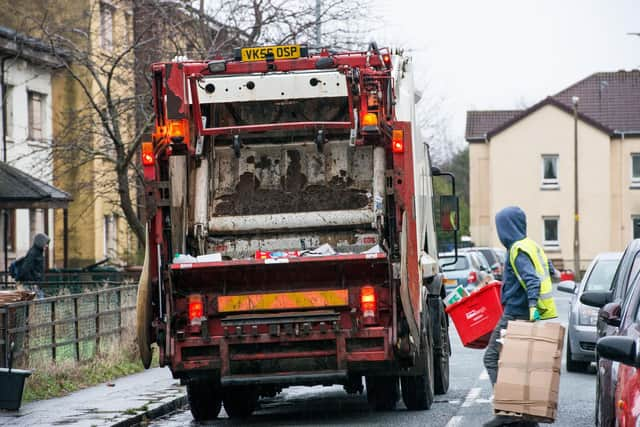Edinburgh safety concerns after council vehicles involved in 1,890 collisions in eight years
and live on Freeview channel 276
New safety concerns have been raised after figures revealed council vehicles in Edinburgh are involved in more than 200 collisions every year.
It comes just weeks after the death of an 11-year-old boy after he was hit by a commercial bin lorry in Barnton as he cycled to school. Councillors meeting after the tragedy vowed to do all they could to prevent a repeat of the crash which claimed the life of Thomas Wong, a pupil at Cramond Primary School, who was described by his family as “the perfect son”.


Advertisement
Hide AdAdvertisement
Hide AdFigures released under Freedom of Information legislation show that since 2015, there have been 1,890 incidents recorded as “collisions” involving vehicles from the council’s fleet. The council was unable to say how many incidents related to refuse vehicles.
The council was asked whether it had implemented the recommendation of the 2015 Fatal Accident Inquiry (FAI) into the Glasgow bin lorry tragedy that councils and other organisations which collect refuse should seek to have Advanced Emergency Braking System (AEBS) fitted to their vehicles wherever reasonably practicable. Six people were killed and 15 others injured after the driver of a council-owned refuse truck blacked out at the wheel in Glasgow’s Queen Street in December 2014.
The council said since November 2015 it had purchased 25 new heavy goods vehicles and all had been fitted with AEBS technology.
The FAI also said councils should explore retrofitting AEBS to vehicles where that was possible. The council said it had 210 Large Goods Vehicles (LGVs) on its operator licence, of which 115 had AEBS and 95 did not.
Advertisement
Hide AdAdvertisement
Hide AdIt added: “The cost of retrofitting AEBS to older vehicles was considered prohibitive due to the level of work required to strip out and refit existing vehicle equipment. Some LGV makes cannot be retrofitted due to the construction of the vehicle mechanics and bodywork.”
Lib Dem councillor Kevin Lang, whose Almond ward includes Cramond, said: “With figures showing almost five collisions a week involving Edinburgh council vehicles, it is clear every effort needs to be made to ensure the fleet is operating as safely as possible and HGVs in particular.
“The tragic death of Thomas Wong in Barnton last month after a collision with a commercial bin lorry, as well as other fatal incidents involving HGVs in Scotland, should serve as a wake-up call on the need to improve safety.
“That is why I was pleased to get cross-party support for my motion at the last council meeting to get a full review of the operations of council HGVs. This includes looking at changing waste collection routes and timetables so heavy vehicles are not operating next to schools when so many young children are nearby.”
Advertisement
Hide AdAdvertisement
Hide AdAnd he said: “It is also striking that only around half of council owned HGVs are equipped with advanced emergency braking systems, a specific recommendation that came from the 2015 Glasgow FAI. The council clearly needs to go further and faster in terms of installing on-vehicle safety equipment to minimise the potential for accidents in future. The council must be a leader when it comes to best practice.”
Edinburgh transport convener Scott Arthur said: “The safety of all of our vehicles is extremely important. In line with the recommendations of the inquiry, all new council-owned refuse vehicles which have been purchased since the 2015 Glasgow FAI are fitted with AEBS technology. We are investing heavily in a new modern fleet, with new refuse vehicles arriving over the course of 2024 and early 2025, and all of these vehicles will have AEBS technology installed.”
Comment Guidelines
National World encourages reader discussion on our stories. User feedback, insights and back-and-forth exchanges add a rich layer of context to reporting. Please review our Community Guidelines before commenting.